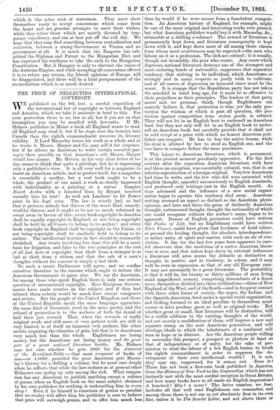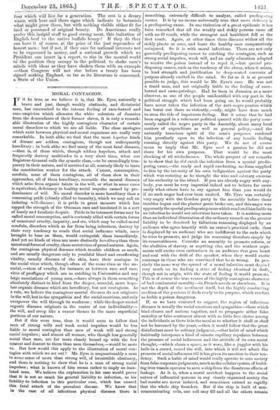THE PRICE OF NEGLECTING INTERNATIONAL COPYRIGHT.
I'VE published on the 9th inst. a careful exposition of
the international law of copyright as between England and America, which we take it amounts in brief to this. For your protection there is no law at all, but if you act on that assumption you may be assailed with law-suits. If Mr. Holmes publishes in Maine a book all England wants to read, all England may steal it, but if he steps over the frontier into Canada then the eighth commandment recovers its literary validity. If Lord Macaulay issues his work as a whole and as he wrote it Messrs. Harper and Co. may sell it for sixpence, but if he allows an American to write certain essential pas- sages, then possibly on that American's suit Messrs. Harper would lose money. Mr. Rotten, in his very clear letter of to- day, seems to think that• quite a privilege, but he is expressing only a publisher's view. It is all very well for a magazine to insert an American article, and so protect itself, for a magazine is essentially a medley, but a real book ought to be a whole, the product of one mind, a work as clearly impressed with individuality as a painting or a statue. Imagine Enoch Arden with a hundred lines by Bryant inserted casually into its text ! As well ask Landseer to let Power paint in his dogs' eyes. The law is utterly bad, so bad that it protects nobody but thieves of the worst kind, namely, wealthy thieves, and it ought to be not so much reformed as swept away in favour of this : every book copyright in America shall be equally copyright in England, or not being copyright shall be held by all Courts to belong to its author ; and every book copyright in England shall be copyright in the Union, or not being copyright shall be similarly held to belong to its author. The intellectual frontier in fact should be summarily abolished. Any treaty involving less than this will be a mere basis for litigation, and false to the two principles at the root of all just Acts of copyright, that theft from a stranger is as bad as theft from a citizen, and that the sale of a man's thoughts without his consent is simply a bad theft.
To such a treaty Parliament will agree, and we confine ourselves therefore to the reasons which ought to induce the American Government to agree also. We say the American, for among those who speak English there is only one serious question of international copyright. Most European Govern- ments have made treaties on the subject, and if they had refused them nobody would be much hurt except composers and artists. But the people of the United Kingdom and those of the United Republic speak the same language, appreciate the same kind of literature, revel in the same poetry, and the refusal of protection is to the authors of both the denial of half their just reward. That, when the rewards of really original work, and still more of very patient work, are still so very limited, is of itself an immense evil, authors, like other artists, requiring the stimulus of gain, but that is to Americans very much less than the whole. Englishmen are losing money, but the Americans are losing money and the pros- pect of a great national literature besides. Mr. Holmes may not care whether he gets 5001. for the Autocrat of the Breakfast-Table — that most croquant of books of ana—or 1,000!., provided the poor American gets Macau- lay's history for a shilling a volume, but he must care deeply when he reflects that while the law endures as at present other Holmeses can spring up only among the rich. What tempta- tion has any American to publish anything except a volume of poems when an English book on the same subject, obtained by his own publisher for nothing, is underselling him in every shop I Even if he himself is conscious of genius so peculiar that no rivalry will affect him, his publisher is sure to believe that price will outweigh genius, and to offer him much less than he would if he were secure from a fraudulent competi- tion. An American history of England, for example, might be one of the most original and interesting works ever penned, but what American publisher would buy it with Macaulay, &c., attainable at a shilling a volume? The reward of literature is permanently kept down, and literature consequently is kept down with it, and kept down most of all among those classes from whom most creativeness may be expected—the men who labour on it as a profession. The rich are critical ; it is usually, though not invariably, the poor who create. Any cause which depresses national literature destroys one of the strongest and most enduring bonds of nationality, suppresses that separatist tendency, that striving to be individual, which Americans so strongly and in many respects so justly wish to cultivate, and of all causes of depression an immoral cause must be the worst. It is strange that the Republican party has not taken the mischief in hand long ago, for it must be as offensive to their prejudices as their principles. The leaders of that party assert and, we presume, think, though Englishmen can scarcely believe it, that protection is wise, yet the only pro- tection the wisdom of which is past all question, the pro- tection against competition from stolen goods, is refused. They will not let in an English boot to undersell an American boot, but they not only will let in an English book to under- sell an American book, but carefully provide that it shall not be sold except at a price with which no honest American pub- lisher can compete. He has to buy the native broom, while his rival is allowed by law to steal an English one, and the two hare to compete before the same purchaser.
This injury to American literature, which is permanent, is at the present moment peculiarly oppressive. For the first century after the separation American literature, with here and there an exception, was essentially colonial, was, that is, an inferior reproduction of a foreign original. Veryfew Americans had time to write, and the few who did were saturated with English thought, appealed unconsciously to English standards, and produced only writings cast in the English mould. As time advanced and the influence of a new social organi- zation began to operate this tendency died away.. American writing assumed an aspect as distinct as the American physi- ognomy, and here and there the germ of distinctly American thought, unborrowed thought, thought the nationality of which one could recognize without the author's name, began to be apparent. Dozens of English poetasters could have written the Psalm of Lift, but no Englishman could have written Elsie Penner, could have given that freshness of local colour, or pressed the leading thought, the absolute interdependence, or rather unity, of spirit and matter, with such an air of con- viction. It has for the last few years been apparent to care- ful observers that the seed-time of a native American litera- ture is over, and that unless kept down by external influences a literature will arise across the Atlantic as distinctive in thought, in motive, and in tendency, in colour, and it may well be even in expression, as that of any old European race. It may.not necessarily be a great literature. The probability is that it will be, for twenty or thirty millions of men living amid magnificent scenery, comprising descendants of a dozen races, themselves divided into three civilizations—those of New England, of the West, and of the South—and in frequent contact with three other forms of society, the negro, the Indian, and the Spanish-American, bred under a special social organization, and looking forward to an ideal peculiar to themselves, must sooner or later produce great as well as original works. But whether great or small, that literature will be distinctive, will be a visible addition to the existing thoughts of the world, and not merely a modification of them, will impress anew and separate stamp on the next American generation, and will develope ideals to which the inhabitants of a continent will turn in hope or in distrust. Are the American people willing to surrender this prospect, a prospect as glorious at least as that of independence or' of unity, for the sake of per- mission to steal the labour of a few English brains, to break the eighth commandment in order to suppress the de- velopment of their own intellectual. wealth ? It is not, they may say, suppressed, for it comes out. Does it ? There has not been a first-rate book published in America, from the History of New York to the Gayworthys, which has•not instantly met with the most cordial reception in Great Britain, and how many books have in all made an English impression? A hundred ? fifty ? a score The latter number, we fear, includes all that well read Englishmen can remember, and among them there is-not one as yet absolutely _first in its own line, unless it be The Scarlet Letter, and not above three or
four which will live for a generation. The rest is a dreary Waste, with here and there signs which indicate to botanists what might grow there, but with nothing visible either fit for foOd or possessed of original beauty. Do Americans really prefer this insipid stuff to good strong meat; this imitation of
English beef to the native buffalo hump ? If they they can have it of course, at the price Of the just reproaches of honest men ; but if not, if they care for national interests not to be expressed in money, and a national growth which no President can insert in a report, to rise in the mental world to the position they occupy in the political, to shake men's minds with ideas as they have shaken them with an example —then Congress will not rise before a treaty his been signed making England; . so far as its literature is concerned, a' State of the Union.



































 Previous page
Previous page